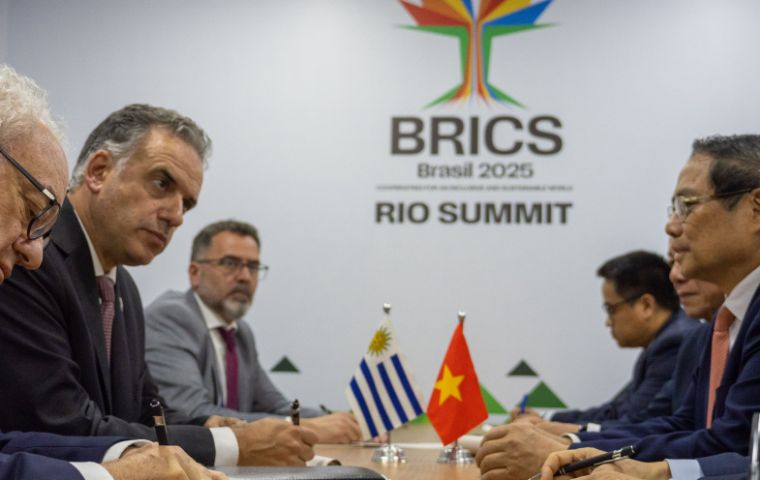MercoPress. South Atlantic News Agency
China and Uruguay launch joint agri-science cooperation project
 Carámbula underscored that the joint laboratory “strengthens the country's science, technology, and innovation”
Carámbula underscored that the joint laboratory “strengthens the country's science, technology, and innovation” Scientific and educational institutions from China and Uruguay have signed a memorandum of understanding to establish a groundbreaking Joint Pasture Agriculture Laboratory, aiming to strengthen scientific and technological cooperation in agricultural innovation under China's Belt and Road Initiative.
The agreement was formally signed on Tuesday at the INIA Las Brujas Experimental Station, 40 kilometers from Montevideo, by officials from Uruguay's National Agricultural Research Institute (INIA), China's Qingdao Agricultural University, and the private firm Reevolution.
The new joint laboratory is designed to drive progress in Genetic Improvement and Plant Biotechnology for pasture and forage production; Digital Agriculture, focused on grasslands, utilizing sensors, satellite imagery, and the Internet of Things (IoT); and the Genetic Improvement of Cattle, specifically targeting meat and milk quality through the use of in vitro fertilization and frozen embryos.
The project also includes plans to develop research centers, technological demonstration sites, talent training programs, and digital and genetic industrial bases.
Zhao Jinshan, President of Qingdao Agricultural University, said during the ceremony that they were “sowing the seeds of a lasting and mutually beneficial partnership in the fertile fields of science” that will generate a “positive and significant impact for our peoples and industries.” The university, based in China's Shandong province, is renowned for its research in agriculture and engineering.
Uruguayan scientist Germán Spangenberg, a promoter of the initiative, stated the goal is to “integrate genetic and digital innovation to improve the sustainable production and utilization of pastures.” Local officials emphasized that the laboratory adds tangible scientific content to the existing bilateral framework.
Miguel Sierra, President of INIA, told Xinhua that since Uruguay was the first Southern Common Market (Mercosur) country to sign a Belt and Road cooperation memorandum in 2018, the focus now must be on “filling it with content, especially with science and technology.”
Sierra highlighted multiple potential areas for collaboration—including food, fiber, energy, cosmetics, and Artificial Intelligence—which “add value to Uruguay, allow us to diversify our productive matrix, and also connect us with our main market.” He added that Uruguay offers well-equipped experimental stations, stability, and high regard for regulations and sustainability, making it an ideal regional hub for the project.
Uruguay's Deputy Livestock Minister Matías Carámbula underscored that the joint laboratory “strengthens the country's science, technology, and innovation,” thanks to Uruguay's “stability, planning, and quality in its human resources.”
China has been Uruguay's main trading partner and largest market for over a decade, providing a robust diplomatic and economic foundation for the new scientific venture.




Top Comments
Disclaimer & comment rulesCommenting for this story is now closed.
If you have a Facebook account, become a fan and comment on our Facebook Page!